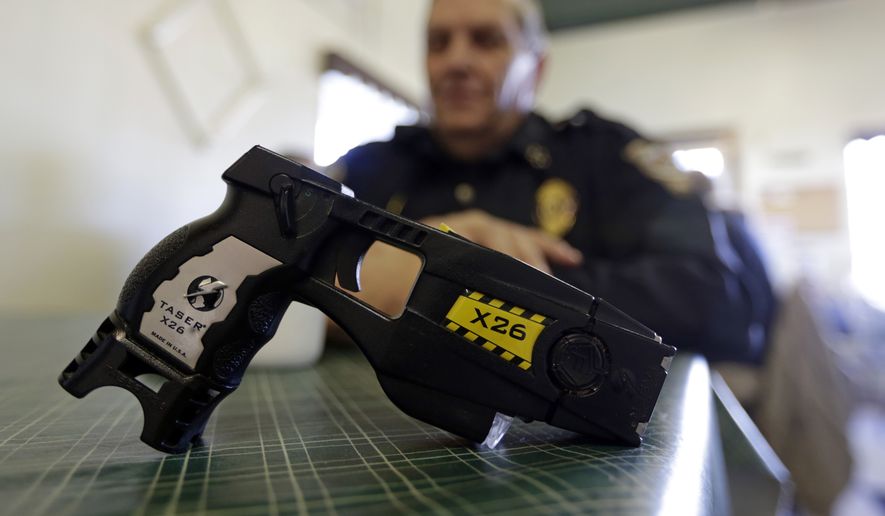Five states and several cities outlaw possession of stun guns, even for self-defense. But such bans could fall by the wayside in the coming year as Second Amendment advocates ramp up court challenges against jurisdictions that deem the weapons illegal.
The D.C. Council last week approved legislation to roll back a city ban on possessing stun guns, as well as a requirement for residents to register pepper spray with police, after the ban was challenged in court.
Officials in New Jersey and New Orleans are working to settle similar lawsuits brought this year claiming bans on stun gun ownership violate residents’ constitutional right to bear arms. Lawyer Stephen Stamboulieh, who is representing clients in both cases, said agreements to settle will require judges to strike down the bans or lawmakers to revise the regulations.
Stun guns are designed to immobilize attackers through high-voltage electric shocks that are administered either through direct contact with prongs or by striking a target with dartlike projectiles. People who have gone to court to seek the right to carry the devices say they would prefer having a nonlethal weapon for self-defense rather than a firearm but have cited Second Amendment protections in defending their right to do so.
What resulted in the flurry of lawsuits challenging bans on stun guns was a Supreme Court ruling in March that cast doubt on the legality of a Massachusetts ban on ownership of the devices. The ruling did not overturn the ban but rejected arguments invoked by the Supreme Judicial Court of Massachusetts, in which judges ruled that stun guns were not protected under the Second Amendment because they “were not in common use at the time of the Second Amendment’s enactment.” The case was sent back to the lower court, where the charges ultimately were dropped.
Mr. Stamboulieh and other Second Amendment advocates say the decision laid the groundwork for challenges to other bans of nonlethal items for self-defense.
In the nation’s capital, three residents challenged the city’s ban on stun gun possession over the summer and were allowed to keep Tasers in their homes while the lawmakers debated repeal legislation.
On Dec. 20, the D.C. Council unanimously approved legislation that will allow people 18 and older to purchase and carry stun guns throughout the city — except inside certain facilities such as government buildings and schools.
Mr. Stamboulieh also has filed lawsuits on behalf of residents in New York, New Jersey and New Orleans. He expects to file legal challenges in two states that outlaw stun guns: Hawaii and Rhode Island.
“We are going to make them justify their reasons to the court if they want to keep [the bans],” Mr. Stamboulieh said. “When you talk about Second Amendment rights, you have to fight tooth and nail.”
Acknowledging the Supreme Court decision, New Jersey Attorney General Christopher S. Porrino wrote in court filings last month that officials “recognize that an outright ban on the possession of stun guns within a state, regardless of the contextual circumstances surrounding any such possession, would likely not pass constitutional muster.”
But the state is concerned about having time “to issue reasonable regulations related to the possession, use and sale of stun guns” before agreeing to a settlement that would repeal the ban, Mr. Porrino wrote.
Heading into a Jan. 24 conference in the case, Mr. Stamboulieh, who is working with the New Jersey Second Amendment Society, has raised concern about the state’s continued enforcement of the ban. In a letter this month to the federal magistrate judge overseeing the case, attorneys included charging documents from Wayne Township Municipal Court that show a woman was charged with illegal possession of a stun gun there on Dec. 6.
“Without a ruling from this Court that the statute is unconstitutional, citizens are continually subjected to prosecution for disobeying a conceitedly unconstitutional law,” attorney Ryan Watson wrote.
Similar negotiations began in New Orleans after resident John Ford challenged the constitutionality of the citywide ban on the sale, purchase and possession of stun guns.
Under a deal reached this month that holds off an injunction of the ban until at least March 15, Mr. Ford is allowed to purchase and carry a stun gun anywhere in the city where a firearm may be legally carried. The stipulated agreement notes that the city “may attempt to resolve this litigation by revising the relevant provisions of City Code to address the stun-gun provision that plaintiff alleges to be unconstitutional.”
The New Orleans mayor’s office did not respond by deadline to a request for comment on the city’s plans to address the ban.
With the help of Mr. Stamboulieh, the Firearms Policy Coalition is challenging a ban in New York.
“The Second Amendment absolutely protects the right of law-abiding people to buy and possess all arms in common use for self-defense, like Tasers,” said coalition President Brandon Combs. “We are more than happy to remind New York that the right to keep and bear arms prevails over paternalistic and unconstitutional statutes like theirs.”
The New York attorney general’s office declined to comment on the case.
If the lawsuits succeed in overturning the stun gun bans, Mr. Stamboulieh said, his work doesn’t stop there. He intends to challenge bans on other items commonly used for self-defense, including martial arts weapons such as nunchucks and batons.
“We are going to expand out as far as we can to encompass every arm that should not be banned,” he said.
• Andrea Noble can be reached at anoble@washingtontimes.com.




Please read our comment policy before commenting.